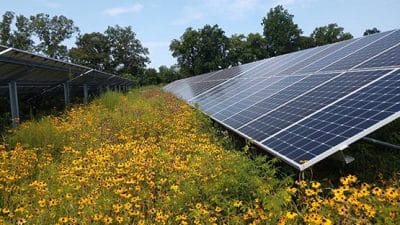
The Federal Energy Regulatory Commission is being asked to certify the public benefit and necessity of the project. The FERC and a number of participating agencies will examine fully a broad number of issues, including public safety, air quality, water resources, geology, soils, wildlife and vegetation, threatened and endangered species, land and visual resources, cultural and historic resources, noise, cumulative impacts and reasonable alternatives.
Four major U.S. energy companies – Dominion (NYSE: D), Duke Energy (NYSE: DUK), Piedmont Natural Gas (NYSE: PNY) and AGL Resources (NYSE: GAS) – formed Atlantic Coast Pipeline, LLC, (Atlantic) to build and own the proposed Atlantic Coast Pipeline (ACP). The pipeline would transport abundant natural gas supplies from Harrison County, W.Va., southeast through Virginia with an extension to Chesapeake, Va., and south through central North Carolina to Robeson County. Pending regulatory approval, construction is expected to begin in the second half of 2016 and the pipeline is expected to be in service in the fourth quarter of 2018.
The 30,000-page application, environmental resource reports and exhibits – a stack of paper more than 10 feet tall – represent an extensive study by Dominion and outside experts as well as public input to find the best route to bring the much-needed energy to Virginia and North Carolina. Atlantic has considered more than 3,000 miles of potential routes and made hundreds of route adjustments based on discussions with landowners, public officials and others. Atlantic has participated in more than 60 public meetings involving thousands of interested individuals, agencies and organizations.
“The Atlantic Coast Pipeline is essential to meeting the clean energy needs of Virginia and North Carolina, and has significant benefits for West Virginia as well,” said Diane Leopold, president of Dominion Energy, the Dominion business unit responsible for building and operating the project. “The ACP will enhance overall energy reliability in the region, bringing natural gas that will heat homes and power businesses, support thousands of jobs, and promote lower energy prices and economic development. It will be used to fuel a new generation of efficient power stations being built to achieve future federal and state environmental regulations.
“We are committed to excellence in every aspect of this important project. We will continue to work with landowners, government and community leaders, regulators and others to address concerns and refine the project,” Leopold added.
The ACP has strong support from Govs. Earl Ray Tomblin of West Virginia, Terry McAuliffe of Virginia and Pat McCrory ofNorth Carolina, and other federal, state and local officials. A three-state coalition of more than 150 business and labor organizations, EnergySure (www.energysure.com), recently announced its support for the project and the economic development that it is projected to create.
- Consumers and businesses in Virginia and North Carolina could save an estimated $377 million annually in lower energy costs thanks to the ACP, according to a study by ICF International (www.dom.com/acp-icf). That study also found that more than 2,200 full-time, permanent jobs could be created in the two states because of the lower energy prices. The new jobs would come from businesses being able to reinvest their energy savings in growth and from energy-intensive manufacturing industries once an abundant supply of affordable natural gas is assured.
- One-time construction activity of the ACP could inject an annual average of $456.3 million into the economies of the ACP’s three states, supporting 2,873 annual jobs in the region from 2014 to 2019, according to Chmura Economics & Analytics (www.dom.com/acp-chmura).
Local governments along the route also are expected to receive a total of about $25 million a year in new tax revenues when the full value of the project is ultimately reflected in tax payments.
Ownership stakes in Atlantic are: Dominion, 45 percent; Duke Energy, 40 percent; Piedmont, 10 percent; and AGL Resources, 5 percent. Utility subsidiaries and affiliates of all four companies plus PSNC Energy have signed on as customers of the pipeline. Ninety-six percent of the pipeline’s capacity is subscribed by these companies.
For example, Dominion and Duke Energy are building multiple natural gas-fired power stations and closing coal-fired ones to meet growing demand for electricity with less impact to the environment. Natural gas has less than half the output of carbon when compared with coal. The abundant natural gas that would flow through the ACP would provide each utility with more sources from which to secure reliable, cost-competitive fuel and keep customers’ rates reasonable.
Virginia Natural Gas, the subsidiary of AGL Resources in Hampton Roads, has stated that it needs more natural gas to meet customer demand especially during peak times in Chesapeake and Virginia Beach, two of Virginia’s most heavily populated cities. For Piedmont Natural Gas, the ACP will provide access to abundant, low-cost natural gas supplies from a geographically diverse production region and will help the company meet growing demand for natural gas in its Carolina markets.
Dominion has completed surveying about 85 percent of a proposed route that meets the operational and reliability needs while minimizing the impact on the environment as well as historical and cultural resources. Atlantic will file supplemental information with the FERC when surveying is completed and propose a final route.
Dominion Transmission Inc. applied simultaneously to the FERC for permission to build its Supply Header Project, a $500 million project of approximately 38 miles of natural gas pipeline and modified existing compression facilities in West Virginia andPennsylvania. The project will provide natural gas supplies to various customers, including the ACP, allowing the transport of natural gas from supply areas in Ohio, Pennsylvania and West Virginia to underserved market areas in Virginia and North Carolina.
The application and resource reports are available on the ACP website, www.dom.com/acpipeline, and the FERC website. Digital copies will be placed in public libraries along the route.










